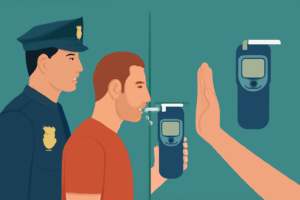When you’re pulled over under suspicion of driving while intoxicated (DWI) in Texas, one of the most significant decisions you’ll face is whether to take a breath test. Texas law requires drivers to submit to chemical tests to determine alcohol or drug impairment, but that doesn’t mean it’s an easy decision. Both refusing the test and failing it come with serious consequences. Understanding the potential outcomes of each can help you make a more informed choice if you’re ever in that situation.
Firm Accolades
Texas Implied Consent Law: What You Need to Know 
Texas operates under an implied consent law, meaning that if you’re driving in the state, you’re presumed to have already agreed to submit to a chemical test if law enforcement suspects you’re driving under the influence. Essentially, by getting behind the wheel, you’ve agreed that if requested by an officer, you’ll take a breath, blood, or urine test to measure your blood alcohol content (BAC).
Refusing to take the test carries automatic penalties, including the suspension of your driver’s license. However, submitting to a test doesn’t guarantee you will avoid criminal penalties. Knowing the consequences of both actions is key to understanding what might happen.
What Happens If You Refuse a Breath Test in Texas?
Refusing a breath test in Texas can seem like a reasonable option to avoid incriminating evidence, but the penalties are severe. Refusing a breath test can lead to the following consequences:
Managing Partner Partner & Criminal Division Chief Criminal Division Trial Chief Criminal Trial Division Criminal Trial Division Of Counsel

License Suspension
The most immediate consequence of refusing a breath test is the automatic suspension of your driver’s license for 180 days. If you’ve refused a breath test within the last 10 years, you could face a two-year suspension.
Warrants for Blood Tests
If you refuse a breath test, law enforcement officers may still obtain a warrant to take a blood sample. This means that refusing the breath test may not keep you from having a blood test used against you.
Criminal Implications
While refusing the test means there’s no direct evidence of your BAC, prosecutors may argue that your refusal is indicative of guilt, making it harder to defend against DWI charges. Judges and juries might consider refusal as evidence that you knew you were impaired.
Increased Penalties for Subsequent Refusals
If you’ve previously refused a breath test within the past 10 years, the penalties for a second refusal are much more severe. Your license suspension could be longer, and fines or other penalties may apply.
Despite these penalties, refusing the test might make sense in certain situations. If you believe your BAC will exceed the legal limit of 0.08%, avoiding direct evidence of impairment might work in your favor. However, this is a risky strategy that can lead to long-term consequences.
Consequences of Failing a Breath Test in Texas
If you decide to take the breath test and fail it by registering a BAC of 0.08% or higher, the consequences are just as severe, but different. Failing the test provides direct evidence of impairment, and prosecutors can use this against you in court. Here’s what happens if you fail the test:
Automatic Arrest
If you fail a breath test and your BAC exceeds the legal limit, you’ll be arrested and charged with DWI. The arrest will typically be accompanied by a temporary suspension of your driver’s license.
License Suspension
For a first-time DWI offense, your license can be suspended for 90 days to 1 year. The duration depends on whether you submit to an administrative license revocation (ALR) hearing and whether you have prior DWI convictions. Failure to attend an ALR hearing or contest the suspension will result in a longer suspension.
Fines and Fees
Convictions for DWI often come with hefty fines, ranging from $2,000 for a first offense to much higher amounts for subsequent convictions. These fines are in addition to legal fees and other penalties.
Biggest Mistakes of a DWI Charge Choosing a Personal Injury AttorneyRelated Videos
Jail Time and Probation
If convicted of DWI, the penalties may include jail time, especially if you have prior convictions. For a first-time offense, you could face up to 180 days in jail and up to 2 years probation. However, more serious penalties apply if there are aggravating factors, such as a child passenger or an accident.
Alcohol Education and Treatment Programs
Texas also mandates that offenders attend DWI education programs. These programs can range from several months to over a year, depending on the circumstances of the case and the judge’s ruling.
Failing a breath test provides clear evidence of your impairment, which can be used against you in court. This makes it more difficult to contest your DWI charge. However, a failure doesn’t automatically result in a conviction, especially if there are issues with the accuracy of the test or how it was administered.
Case Results
Is Refusing the Breath Test Ever a Good Idea?
Refusing a breath test might be beneficial in some cases, but the risk of severe consequences is high. One reason to consider refusal is to avoid providing the prosecution with clear evidence of your impairment. If you’re confident that your BAC will exceed the legal limit, refusing the test may prevent prosecutors from using that evidence against you.
However, it’s important to note that refusing a breath test doesn’t automatically guarantee you will avoid criminal charges. Law enforcement can still obtain a blood sample with a warrant, and refusal can be seen as a sign of guilt, making it harder to defend against the charges.
In addition, the automatic suspension of your driver’s license for 180 days (or up to 2 years for subsequent refusals) is a serious penalty that should not be taken lightly. It can make it difficult to get to work, school, and other essential activities, significantly impacting your daily life.
What About the Breath Test
Agreeing to take the breath test might be the better option in some cases. While the consequences of failing the test are severe, the direct evidence of your BAC can sometimes work in your favor if the evidence is questioned or mishandled. Additionally, the penalties for failing a breath test are more predictable, and you may have a better chance of reducing or contesting the charges if you fail the test.
If you’ve consumed alcohol but believe your BAC is under the legal limit, taking the test may prove you were not impaired, which can help your case. Keep in mind, however, that refusing the test increases the likelihood of facing severe penalties, even if you were not impaired.
The Impact of a DWI on Your Future
A DWI conviction can have long-lasting consequences. Beyond fines and license suspension, a DWI conviction will result in a permanent criminal record, which can affect your ability to find a job, rent housing, or apply for loans. A DWI can also result in increased auto insurance premiums, which can be financially burdensome for years to come.
Moreover, multiple DWI convictions will increase the severity of penalties and can lead to felony charges, longer license suspensions, higher fines, and potentially prison time. If you refuse the breath test or fail it multiple times, you may also face increased penalties for subsequent offenses.
How Can a DWI Lawyer Help?
Whether you refused the breath test or failed it, the most important thing you can do after a DWI arrest is to hire an experienced DWI defense attorney. A skilled lawyer will know the ins and outs of Texas DWI laws and can advise you on the best course of action for your case.
An attorney can challenge the legality of the traffic stop, the accuracy of the breath test, and the procedures followed by law enforcement during your arrest. In some cases, they may be able to get charges reduced or dismissed entirely.
If you’re facing serious DWI charges, it’s crucial to consult with a lawyer as soon as possible. Deandra Grant Law offers free consultations to help you understand your rights and the options available to you. Don’t wait—contact us today to get the legal help you need.



























